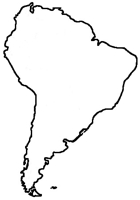
|
The Society of Folk Dance Historians (SFDH) South America
[
Home |
About |
Encyclopedia | CLICK IMAGE TO ENLARGE |

|
BACKGROUND
Information: A continent.
South America is a continent in the Western Hemisphere, mostly in the Southern Hemisphere, with a relatively small portion in the Northern Hemisphere. It is bordered on the west by the Pacific Ocean and on the north and east by the Atlantic Ocean, North America, and the Caribbean Sea lie to the northwest.
The continent's cultural and ethnic outlook has its origin with the interaction of indigenous peoples with European conquerors and immigrants and, more locally, with African slaves. Given a long history of colonialism, the overwhelming majority of South Americans speak Portuguese or Spanish, and societies and states reflect Western traditions.
In 1917 Brazil declared war on the Central Powers and join the allied side in the World War I, sending a small fleet to the Mediterranean Sea and some troops to be integrated with the British and French troops. Brazil was the only South American country that fought in WWI. Also in this period the first naval battle of World War II was fought on the continent, in the River Plate, between British forces and German submarines. The Germans still made numerous attacks on Brazilian ships on the coast, causing Brazil to declare war on the Axis powers in 1942, being the only South American country to fight in this war, too.
Languages: Predominantly Spanish, Portuguese, with some indigenous South American languages
Religion: Predominantly Roman Catholic
COUNTRIES
ALSO CONSIDERED PART OF SOUTH AMERICA
- ABC Islands
- Falkland Islands
- French Guiana
- Tobago
- Trinidad
DANCES
Michael Herman Folk Dancer LP MH004
- Gato (Arg)
- Chacarera (Uru)
- La Palomita (Par)
- La Chamarrita (Uru)
- Refalosa Tambeana (Arg)
- Jota Criolla (Arg)
- Carnavalito (Bol)
- Polka (Par)
- Ranchera (Uru)
- Pezinho (Brz)
- Chotis (Brz)
- Pala Pala (Arg)
Michael Herman Folk Dancer LP MH005.
- Cueca (Chl)
- Hayta Huaytucha (Bol)
- El Palito (Arg-Uru)
- Ranchera de Carrerinha (Brz)
- La Trastasera (Chl)
- El Costiller (Chl)
- Cielito (Uru)
- Cuando (Arg)
- Araruna (Brz)
- Alonsito (Par)
- Chascanahui (Arg-Bol)
- El Sombrerito (Arg)
The Paraguayan had the most interesting music, and I'd especially like to pick up those numbers. I'm pretty certain that there were notes at one time for "Polka," since I found a listing in the card catalogue a University of Pacific (Stockton, California). That is where I first ran across Nelda Drury's name. Unfortunately, someone had made off with the notes that had been on file. There it was listed as "Llegada Polka." When I spoke to Nelda, there was a faint recognition of the title "Llegada Polka," but she doesn't think she has the notes any longer. She did mention that the dance might have gone under other spellings. I would think "Polka" (as noted above – of course there are probably hundreds of dances by that name), "Paraguayan Polka," "Llegada Polka," "Legada Polka," "Yegada Polka," or even "Yyegada Polka" might be possibilities – the last two on account of pronunciation.
- Gato (Arg) – pre-Nelda notes
- Chacarera (Uru) – pre-Nelda notes
- La Palomita (Par) – Nelda's notes
- La Chamarrita (Uru) – pre-Nelda notes
- Refalosa Tambeana (Arg)
- Jota Criolla (Arg) – Nelda's notes
- Carnavalito (Bol) – definitive notes in Folk Dance Problem Solver (1992)
- Polka/Llegada Polka (Par)
- Paraguayan Polka, Llegada Polka, Legada Polka, Yegada Polka, Yyegada Polka (Par)
- Ranchera (Uru) – Nelda's notes
- Pezinho (Brz) – Nelda's notes
- Chotis (Brz) – two candidates for this one
- Pala Pala (Arg) – pre-Nelda notes
- Cueca (Chl) – pre-Nelda notes
- Hayta Huaytucha (Bol)
- El Palito (Arg-Uru) – pre-Nelda notes
- Ranchera de Carrerinha (Brz) – probably Nelda's notes
- La Trastasera (Chl)
- El Costiller (Chl)
- Cielito (Uru)
- Cuando (Arg) – pre-Nelda notes
- Araruna (Brz)
- Alonsito (Par)
- Chascanahui (Arg-Bol)
- El Sombrerito (Arg)
- Llanero – definitive notes in our 1997 Problem Solver
DOCUMENTS
- Americas, a region.
- Argentina
- Beware of Your Behavior in Foreign Lands, a list.
- Brazil
- El Costiller, a dance game.
- Peru
This page © 2018 by Ron Houston.
Please do not copy any part of this page without including this copyright notice.
Please do not copy small portions out of context.
Please do not copy large portions without permission from Ron Houston.